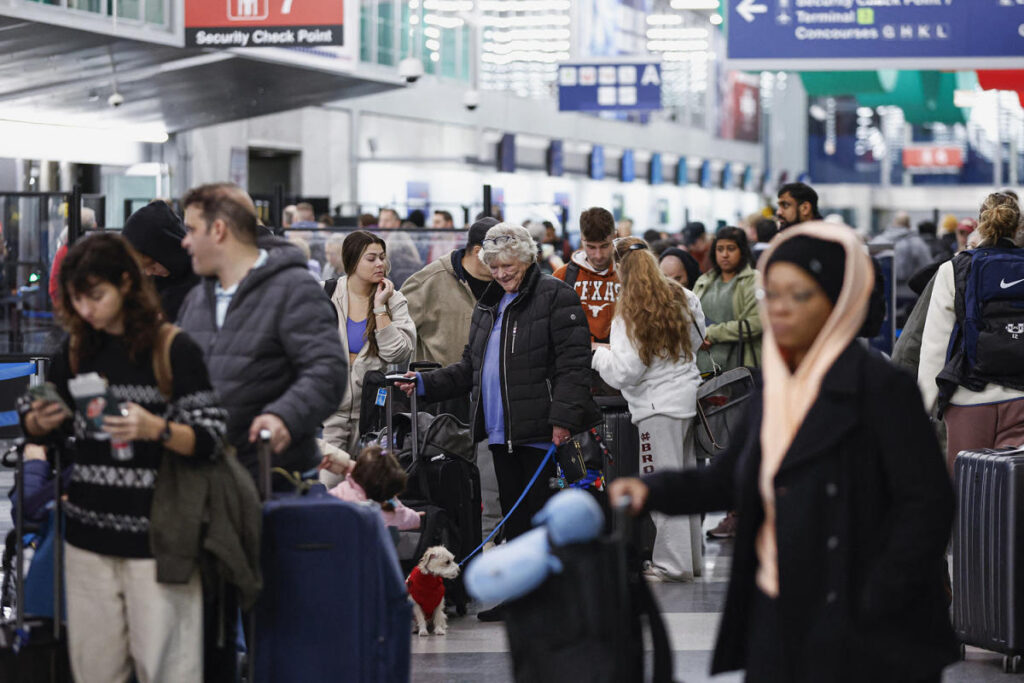The impending threat of a government shutdown is raising concerns for holiday travelers in the United States, particularly emphasizing the potential disruptions at airports across the nation. The Transportation Security Administration (TSA) has projected that it will screen around 40 million passengers through early January, yet the shutdown could lead to significant delays. Currently, about 59,000 of the TSA’s approximately 62,000 employees are prepared to work without pay in the event of a funding lapse. TSA Administrator David P. Pekoske has made it clear that, while personnel are ready to handle high traveler volumes and ensure safety protocols, an extended government shutdown may result in longer wait times at security checkpoints, thereby complicating holiday travel plans.
Additional economic repercussions may also surface if a government shutdown occurs, with estimates suggesting a loss of approximately $1 billion per week in the travel economy. The outlook for travel during this holiday season is especially precarious as the House of Representatives advanced a funding bill just before the deadline, with uncertainty remaining around its passage through the Senate and eventual approval by President Biden. The last significant government shutdown, which lasted 35 days from December 2018, created disruptions that contributed to heightened employee absenteeism within the TSA, causing considerable delays for holiday travelers trying to navigate airports.
It’s essential to highlight that federal law prohibits aviation employees, including TSA and Federal Aviation Administration (FAA) staff, from striking or organizing work stoppages. However, the last shutdown saw an alarming rise in air traffic controller sick calls, significantly impacting airport operations in regions like the Northeast. For instance, there was a nearly threefold increase in callouts at Dallas-Fort Worth International Airport, with the rate of absences among TSA officers ballooning from a typical 3% to a staggering 10%. Such operational challenges could mirror previous experiences during another shutdown, potentially leading to frustrating delays for travelers this season.
Beyond air travel, rail services are also anticipated to experience disruptions due to a government shutdown. Though Amtrak employees would maintain their paychecks, the Federal Railroad Administration could see about 40% of its personnel furloughed, echoing patterns from the 2018-19 shutdown. Employees working in the Office of Railroad Safety may find themselves laboring without a paycheck, further complicating the infrastructure responsible for managing safe rail travel. Thus, while Amtrak’s services might remain consistent, travelers could still encounter logistical challenges and inefficiencies due to reduced oversight and personnel.
For those choosing to drive during the holiday season, the forecast indicates a record number of travelers on the nation’s highways, with approximately 119 million people expected to travel 50 miles or more away from home between December 21 and January 1. This figure reflects an increase of about 3 million more travelers compared to the preceding year. AAA anticipates particularly heavy travel activity on the weekends surrounding Christmas Day, which falls midweek this year. The confluence of travel demands and potential delays from airport disruptions underscores the urgency for travelers to plan their journeys carefully to mitigate stress and uncertainty.
In conclusion, as holiday travel peaks in the United States, the specter of a government shutdown looms large, creating anxiety for millions of potential travelers. The TSA’s preparedness to manage high volumes is commendable, yet the prospect of longer wait times and travel disruptions remains disconcerting, especially given the implications faced during the last extended shutdown. Together with the significant threats to rail services and anticipated surges in highway travel, individuals planning their holiday trips must remain vigilant and flexible in the face of uncertainties that could significantly alter travel experiences during this busy period.

